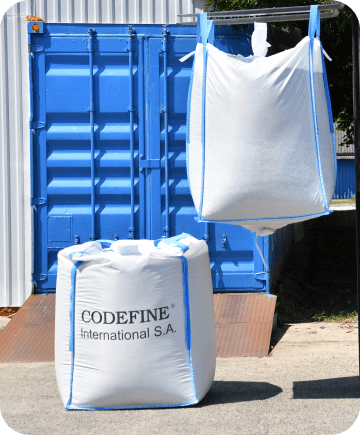Home » Posts Page » Blog » Industry-Specific FIBC Bulk Bag Use Cases

FIBC containers offer many advantages over other types of packaging solutions. At Codefine, you’ll find a wide selection of high-quality flexible bulk containers that are designed to withstand intensive use, making them an ideal pick for multiple industries.
Bulk handling containers are one of the sturdiest solutions for storing and transporting heavy materials. Made from hard-wearing polypropylene, flexible bulk containers can withstand heavy loads and can be used to haul significant loads. A typical FIBC can comfortably carry up to 1,000 kilograms, but others can accommodate twice this amount.
Alongside heavy-duty flexible container materials, the overall construction of FIBCs enhances durability. High-quality seams ensure individual panels remain in place, minimizing the chance of tears occurring. What’s more, container liners can broaden the scope for FIBC use, while extending the lifespan of bulk bags.
If you’re looking to transport delicate or hazardous materials such as pharmaceuticals, chemicals, and fertilizer, FIBC containers are the only option. Bags that are fully compliant with international rules and regulations benefit from enhanced safety credentials, reducing the chance of injury and risk to human health.
FIBCs are a secure way to transport potentially hazardous materials, making them a good choice for companies worried about their environmental impact. What’s more, some FIBCs can be reused several times before needing to be replaced. By utilizing reusable FIBC bags, companies can reduce their dependence on single-use plastic and less sustainable packaging choices.
Polypropylene is also highly recyclable, with the material used to manufacture eco-friendly bulk containers suitable for repurposing once bags have reached the end of their operational life. Sustainable FIBC developments are making it easier for bulk bags to be recycled, while future trends in bulk containers are enhancing the traceability of this enduringly popular packaging solution.
The durability and strength of FIBC bags make them suitable for use across all industry sectors. However, their versatility can be further enhanced by making use of a variety of FIBC design features.
To accommodate different filling and discharging methods, custom FIBC containers can be equipped with unique add-ons. This makes them particularly useful in the agricultural and food processing industries, where items like grains need to be handled. The same applies to the construction sector, where finer materials like sand are commonplace.
The stackability of FIBCs also makes them an ideal long-term storage solution. Bags can be stacked with ease, making them a good option for small spaces with minimal room for warehousing. Bags can also be stacked in vehicles, lowering transportation costs.
Depending on the industry, different vehicles and machinery may be used to handle bags. Whether you’re using cranes to lift and move bulk bags or depend on forklifts to carry pallets from A to B, bulk bags can be readily adapted to ensure a good fit with your machinery of choice.
Owing to their versatility, intermediate bulk containers are utilized across almost every industry sector. They’re hard-wearing nature makes them suitable for use outdoors, meaning they’re a good choice for the agricultural sector and mining industries. Meanwhile, FIBCs enhanced with anti-static protection are ideal for use in the chemical sector. Below, we’ll take a closer look at some of the key industries where FIBCs are used.
Any company that’s involved in the manufacture, handling, or transportation of chemicals needs to seriously consider the packaging used. This applies to all types of chemicals, including non-toxic products, with pharmaceutical bulk bags a popular choice for the storage and shipping of medicines. Even if the contents aren’t toxic, they can still pose a significant health risk to the environment and jeopardize human health. Chemical industry FIBC bags are manufactured to adhere to strict safety guidelines, with FIBC specifications outlining what’s required when handling or transporting them.
As FIBC bags are made from polypropylene, several types of bulk bags boast a high level of resistance to volatile materials that are commonly encountered in the chemical industries. Take TYpe C bags for example. These bags are conductive with anti-static properties, making them ideal for transporting materials like flammable powders.
They’re also well-suited to high-risk environments, such as places where vapors and flammable gasses are present. As a rule, FIBC container compliance guidelines need to be referred to ensure the bulk bags you’re using are fit for purpose in these types of environments.
In the construction industry, FIBCs are an integral part of any operation. As they’re easily filled and discharged, construction bulk containers can be loaded onto vehicles with ease, while safe transportation from A to B is guaranteed. Flexible bulk containers can also enhance the safety credentials of construction sites, with their durability making them suitable for the high-pressure conditions of such environments.
FiBC bags are also a cost-effective and sustainable choice. Bulk bags with a 6:1 safety factor rating can be reused if they’re utilized in a closed-loop system. Meanwhile, FIBCs that have reached the end of their operational life can be recycled, with materials reprocessed into polypropylene that can be used to manufacture new bags or other plastic products.
FIBC bulk bags are regularly used within the agricultural sector. FIBC containers for agriculture serve as a reliable choice of packaging solution, allowing for the safe and secure transportation of fresh produce and perishables. To avoid spoilage and financial losses, packaging used within this sector needs to be breathable.
The generous storage capacities and durable design of bulk bags make them ideal for storing large volumes of things like grains. What’s more, a wide range of perishables can be safely stored in FIBCs provided that adaptations like laminate coatings, container liners, and ventilation have been included.
FIBCs are also a common sight within the food industry. Regularly used in food processing facilities, bulk bags are an ideal choice for safely storing produce while extending the life of perishable items. If food items need to be shipped to international destinations, FIBCs are one of the only reliable choices for packaging.
Additionally, FIBC bulk bags are a useful solution for storing ingredients and food-related materials. Even a small warehouse will be able to comfortably accommodate large volumes of stored goods, while their stackable design also alleviates space pressures and saves costs when transporting items. Bulk bags are also adaptable, with customizable features making it easier for food producers and processors to undertake everyday operations.
However, regulations for intermediate bulk containers are particularly strict. In order to be classified as food-safe FIBC containers, bulk bags need to adhere to be completely compliant with standards set out by the Global Food Safety Initiative (GFSI).
Innovations in FIBC design are also broadening the scope for the use of bulk bags in the food industry. Smart packaging solutions such as QR codes are enhancing traceability, making it easy to track from producer to supplier. This allows for easy detection of any issues with quality or safety concerns.
Because of their durable nature, FIBC bags are an ideal choice for the storage and transportation of metals, minerals, and other bulky materials that are extracted through mining.
Bags used by the mining industry not only need to be incredibly durable, they’re also required to be secure enough that high-value contents can be delivered safely to their intended destination.
FIBCs are able to withstand the punishing conditions of a typical mining operation. Their hallmark robustness means that they can withstand everyday wear and tear, as well as punctures. Meanwhile, their resistance against UV light means that they’re perfect for safeguarding delicate materials against exposure to the elements.

If you’re looking for flexible packaging solutions, FIBCs are the obvious choice. Inexpensive and incredibly versatile, bulk bags boast many advantages over other options like rigid containers. Additionally, FIBCs can be adapted to meet the specific needs of any operation, simplifying processes and streamlining workflows. Certain types of FIBC bags also boast advanced protection against static electricity and propagating brush charges, making them ideal for use in high-risk environments.
Interested in exploring the benefits of FIBC bags for yourself? Make Codefine your first port of call. We’ve been leading the sustainable packaging industry for more than 60 years, with experience working with some of the biggest brands on the planet. You’ll find a full selection of high-quality bulk bags, from space-saving solutions like baffle bags to highly-customizable alternatives designed with specific applications in mind. Ready to explore our full product range? Why not get in touch with the team today?